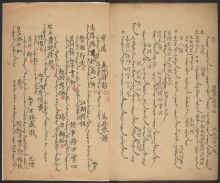Abel-Rémusat and the Secret History of Sinology’s Origins
Mark Elliott - Mark Schwartz Professor of Chinese and Inner Asian History, Department of East Asian Languages and Civilizations & Department of History, Harvard University; Director, Fairbank Center for Chinese Studies
In the last twenty years, Western scholars have begun to pay more attention to the importance of Manchu-language sources in the study of the history of the Qing dynasty (1644-1912). The recent discovery of the value of these materials ought more properly be regarded as a rediscovery, however, since in the early 19th century the first European sinologists had already begun to take a serious interest in the Manchu language, noting then its value for the study of Chinese history and the classics. The pioneer in this regard was the remarkable Jean-Pierre Abel-Rémusat (1788-1832). It was two hundred years ago that Abel-Rémusat was appointed to the first academic post for Chinese studies in the West, a chair in Chinese and Manchu language and literature created at the Collège de France. In his capacity as professor there, and later as a fellow of the Académie des Inscriptions et Belles-Lettres and curator of Oriental manuscripts at the Bibliothèque Royale, Abel-Rémusat helped lay the foundations of both modern Sinology and modern Manjuristics. This lecture examines his career, focusing in particular on Abel-Rémusat’s methods for learning and translating Chinese and the crucial place of Manchu therein.
Mark Elliott (ES ’81, EAS MA ‘84) is the Mark Schwartz Professor of Chinese and Inner Asian History in the Department of East Asian Languages and Civilizations and the Department of History at Harvard University, and Director of the Fairbank Center for Chinese Studies. He is the author of two books, The Manchu Way (Stanford, 2001), and Emperor Qianlong: Son of Heaven, Man of the World (Longman, 2009), along with numerous articles. Apart from Qing history and Manchu studies, Elliott’s research and teaching interests focus on the long relationship between the Chinese heartland and the peoples living in the northern frontier.

